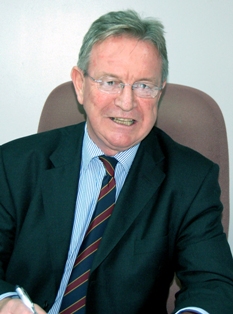 Finance
Finance

US seeks $39M from dead Cayman banker
(CNS): The US government has filed a complaint against the Estate of deceased offshore banker John Mathewson in an attempt to collect on an unpaid judgment for $11.3 million in 1993 that has grown to $39 million, Offshore Alert reported Thursday. The defendants include two Bahamas companies in which Mathewson allegedly "kept most of his money hidden". The action was brought nearly 14 months after Mathewson died at the age of 82. He became one of the most notorious figures in the world of offshore banking when, in 1996, he gave the IRS computer tapes containing the complete accounts statements of over 1,000 customers of Cayman Islands-licensed Guardian Bank & Trust, the offshore watchdog stated.
The action is an attempt to collect "the unpaid balance of certain federal taxes plus statutory additions owed by convicted tax felon John Mathewson who died intestate on November 26, 2009, and to enforce and foreclose IRS tax liens and a judgment in favour of the United States relating to Mathewson’s unpaid tax liabilities", it was stated in an amended complaint filed on June 1, 2011.
"A Judgment in favour of the United States is enforceable for at least 20 years," stated the U. S. Government, which obtained a judgment for $11,329,588, plus interest from April 26, 1993, against Mathewson on September 28, 1993 for his unpaid income taxes from the years 1972 and 1974 through 1985. "As of January 4, 2011, the total amount due on the Judgment against Mathewson was $38,779,655.18."
The action was brought at the U. S. District Court for the Western District of Texas on January 11, 2011 – and the defendants are the Estate of John Mathewson, his widow, Linda Mathewson; Martin O'Neill, Texas NOM limited Partnership, d.b.a. Garrison, Ltd., described as a Texas limited partnership; Texas MON, LC, described as the general partner of Texas NOM; FMBL, Inc., described as a Texas corporation; Enster Corporation, and Marlborough Investments, Inc., which were both described as Bahamas corporations.
See full article at www.OffshoreAlert.com

Dual citizens catch a break on US tax disclosure
 (CNS): Caymanians who are US citizens or green-card holders have been given a bit more time to come clean about their assets to the US tax man as a result of the disruption caused by Hurricane Irene this weekend. Taxpayers who need to apply to the offshore voluntary disclosure initiative (OVDI) of the US Internal Revenue Service (IRS) now have until 9 September to submit their request to participate in the programme to address their past failures to report taxable income to the authorities. There are three processes that people should take in advance of 9 September if they elect to apply for this programme, which includes the pre-clearance process, an OVD letter and requests for extensions.
(CNS): Caymanians who are US citizens or green-card holders have been given a bit more time to come clean about their assets to the US tax man as a result of the disruption caused by Hurricane Irene this weekend. Taxpayers who need to apply to the offshore voluntary disclosure initiative (OVDI) of the US Internal Revenue Service (IRS) now have until 9 September to submit their request to participate in the programme to address their past failures to report taxable income to the authorities. There are three processes that people should take in advance of 9 September if they elect to apply for this programme, which includes the pre-clearance process, an OVD letter and requests for extensions.
By obtaining this pre-clearance from the IRS’s Criminal Investigation division, officials from the financial services secretariat said taxpayers would be able to find out if they are already under investigation and therefore ineligible to participate in the OVDI.
“To request pre-clearance, use the procedure outlined in FAQ 23 of the OVDI FAQs at www.IRS.gov. Fax your pre-clearance request at least 24 hours in advance of 9 September in order to leave time to receive a fax reply indicating if you are preliminarily eligible to participate. Due to the anticipated last-minute rush, it’s best to submit this document as soon as possible before the deadline,” officials advised in a release this week, adding that any information submitted by someone already under investigation could be incriminating.
“Therefore, a person who learns from the pre-clearance process that he or she is already under investigation is advised to seek the advice of a qualified US tax lawyer before submitting additional information to the IRS,” the secretariat said.
Once pre-cleared, tax payers need to submit the Offshore Voluntary Disclosures Letter (OVD Letter) using the format available in FAQ 24 with the taxpayer’s name, address, date of birth and social security number, and as much additional information as possible. And send it to Offshore Voluntary Disclosure Coordinator, 600 Arch Street, Room 6404, Philadelphia, PA 19106.
After that people can request a 90-day extension of time to submit the remaining OVDI materials and payments as outlined in FAQ 25.1 and requests for an extension need to be sent to Internal Revenue Service, 3651 S. I H 35 Stop 4301 AUSC, Austin, TX 78741. ATTN: 2011 Offshore Voluntary Disclosure Initiative.
“There is no guarantee that a request for an extension will be granted. Nevertheless, it is anticipated that the IRS will not want to turn away taxpayers whose submissions indicate a sincere desire to make a full and complete disclosure and pay all amounts that are due,” the secretariat stated, adding that the information was being provided as a public service and does not purport to serve as tax advice.

Cayman judge says injunction legislation outdated
 (CNS): Following the recently lauded decision by a local judge regarding free-standing injunctive relief in the Cayman Islands, another judge from the financial court has said the decision was wrong but that the law needs to be changed. In the recent Gillies Smith v Smith case in the Grand Court Justice Charles Quin granted a free standing Mareva injunction, freezing assets in Cayman despite there being no action in the local courts. Last week, however, Justice Peter Cresswell concluded that the decision was wrong but nevertheless granted a free-standing freezing injunction against Cayman companies, despite there being no action here, and pointed out that Cayman legislation was outdated.
(CNS): Following the recently lauded decision by a local judge regarding free-standing injunctive relief in the Cayman Islands, another judge from the financial court has said the decision was wrong but that the law needs to be changed. In the recent Gillies Smith v Smith case in the Grand Court Justice Charles Quin granted a free standing Mareva injunction, freezing assets in Cayman despite there being no action in the local courts. Last week, however, Justice Peter Cresswell concluded that the decision was wrong but nevertheless granted a free-standing freezing injunction against Cayman companies, despite there being no action here, and pointed out that Cayman legislation was outdated.
Following an urgent ex parte hearing in the financial court last month, Justice Cresswell considered Justice Quin’s earlier ruling, which held that the court has jurisdiction to grant leave to serve out in respect of free standing injunctive relief in the absence of substantive proceedings in the Cayman Islands. Cresswell said he was unable to follow Quin as he found that an injunction in support of proceedings abroad was “interlocutory” and, accordingly, Order 11 of the Grand Court Rules specifically prohibited the granting of permission to serve out of the jurisdiction a writ seeking only such an injunction.
However, he said the Court did have jurisdiction to award freezing orders over the assets of “non-cause-of-action” defendants domiciled in the Cayman Islands, and freezing orders were granted in respect of the assets held by two Cayman companies.
Cresswell noted that legislation in England and the Channel Islands provides for the grant of free standing injunctive relief in aid of foreign proceedings and it was regrettable that Cayman legislation had not yet evolved in this manner. He said the court supported the policy considerations which have led to changes in the foreign legislation, and noted “this lacuna in Cayman legislation and the outdated nature of the Rulesrequire urgent attention.”
In the case, Nigel Meeson QC and Bernadette Carey of Conyers Dill & Pearman represented the plaintiff, which is an English bank seeking to freeze the assets of a defendant resident in Russia and the assets of two Cayman Islands companies, which the plaintiff alleged were under the control of the defendant.
In its application to the Grand Court, the plaintiff, who had already obtained a worldwide freezing order from the English Courts in support of ongoing litigation there, claimed no substantive relief in Cayman other than a free-standing freezing injunction in support of the UK proceedings.
Cresswell’s decision means that these defendants could be served in the jurisdiction via the so-called Chabra jurisdiction, where a freezing order could be granted over the assets of a party against whom no cause of action is asserted, on the basis that those assets may ultimately be available to satisfy a judgment obtained against the defendant against whom a cause of action is asserted.
What was novel about Cresswell’s decision, the attorneys involved said, was that only the non-cause of action defendant was before the Court. However, the court would grant the injunction in support of the English proceedings and a prospective judgment of the English court, which would be enforceable in the Cayman Islands.

Cayman HR chair defends two car families
 (CNS): Richard Coles, who currently has a duel role in the Cayman Islands, has defended the middle classes in a short article for Cayman Finance, one of the two bodies he chairs. Coles, who took over the leadership of the offshore financial services industry organization after Anthony Travers stepped down, is also chair of the Human Rights Commission. In an article answering a UK newspaper comment that says there is "no moral case for tax havens", Cole says that taxes punish the “sub millionaire, middle classes with two cars in the garage and three children heading for college,” and suggests if this section of the community is stifled there will soon be no community.
(CNS): Richard Coles, who currently has a duel role in the Cayman Islands, has defended the middle classes in a short article for Cayman Finance, one of the two bodies he chairs. Coles, who took over the leadership of the offshore financial services industry organization after Anthony Travers stepped down, is also chair of the Human Rights Commission. In an article answering a UK newspaper comment that says there is "no moral case for tax havens", Cole says that taxes punish the “sub millionaire, middle classes with two cars in the garage and three children heading for college,” and suggests if this section of the community is stifled there will soon be no community.
Many human rights groups around the world have concerns about the link between offshore finance and human rights abuses. A significant number of leading NGOs and charities suggest that large corporations that use offshore financial centres to avoid taxes and royalties to developing countries deprive governments – especially those in lesser developed nations — of essential revenues to deliver development, health, education, housing, water and other human rights.
However, in his role as Cayman Finance chair, Cole, Cayman's former attorney general, defends the rights of the tax payer to keep more of what he says is the money they earn and also defends Cayman in the face of the commentary published in the Independent at the weekend.
Echoing the same arguments made by his predecessor, Cole has criticized the article by Paul Valley because he says it repeats the “hoary old clichés” and notes the 12,000 corporations that are registered at Ugland House but, Cole says, it doesn’t mention the Delaware office with 217,000 names on the door.
Coles claimed that the Cayman Islands facilitates the flow of trillions of dollars from the international capital markets to the balance sheets of US institutions, and taking aim at what he said was the UK’s “left wing press", he said it was determined to conflate Cayman, “a perfectly transparent jurisdiction”, with non transparent jurisdictions such as Andorra, Monaco, Liechtenstein and Switzerland, where “as the facts slowly emerge, we inescapably conclude that tax evasion actually occurs,” he said.
The financial association chair said that no one disagrees that “tax evasion is wrong,” especially in the “Cayman Islands where the transparency debate was concluded over 20 years ago,” he stated in the short article, adding that Cayman has tax treaties with the United States and the European Union.
As often argued by Travers, Coles said “only the criminally insane tax evader” would use the Cayman Islands because of the power of access to Cayman accounts that IRS, DOJ and the European Treasuries have.
“Yet we find that the expressions "evasion”, “outrage “, ”loopholes" and "avoidance” are now used interchangeably and indiscriminately to describe Cayman financial structuring without reference to legal and accounting precedent, standard or principle or the factual treaty position,” Cole wrote.
Quoting Daniel J. Mitchell, Cole wrote that tax competition affords taxpayers the ability to enjoy more of what they earn.

Judge finds directors negligent in Cayman fund
(CNS): In what is being described by local legal professionals as a landmark judgement the Grand Court of the Cayman Islands has, for the first time in the context of a failed investment fund, found two directors guilty of wilful neglect. In a ruling delivered Friday the judge ordered that the two directors pay the liquidators, who brought the proceedings on behalf of the failed investment fund, Weavering Macro Fixed Income Fund, US$111 million in damages. The court found that the directors' conduct fell well below what was required of them and were said to have not taken any meaningful role in the business of the fund, merely signing documents which were put in front of them.
Like many Cayman Islands investment funds, the directors enjoyed an indemnity under the terms of the Fund's constitutional documents covering all losses, but it doesn’t cover the two men for losses which were found to be down to the directors' own wilful neglect or default.
Local lawyers Ogier, who represented the official liquidators, David Walker and Ian Stokoe of Pricewaterhousecoopers, said the landmark decision confirms that although Cayman Islands investment funds may be structured differently to traditional corporate entities, the fundamental duties owed by a director of a Cayman Islands investment fund are the same as those duties owed by a director of any other corporate entity.
"The case shows that directors of Cayman Islands investment funds cannot sit idly by, leaving the management and control of the fund to its service providers. A director's duty to supervise the affairs of the company, and to exercise reasonable care, skill and diligence are non-delegable,” said Shaun Folpp, Managing Associate at Ogier Cayman, who, together with Will Jones Associate, acted for the successful plaintiff led by David Lord QC.
“Directors of Cayman Islands investment funds can no longer live under the misconception that they are immune from liability for a company's losses if they do not themselves take an active role in the company's business," Folpp warned.
In his ruling the judge said directors Hans Ekstrom and Stefan Peterson had consciously chosen not to perform their duties in a meaningful way, signing documents without reading them, applying their minds to the content or making any enquiry about the fund “whatsoever”. The judge stated that they never once asked for a written report or attended a board meeting in the six years of the fund’s life.
The fund was incorporated in April 2003 and the directors were both close family members of the principal investment manager, Magnus Peterson, who appointed them. One was his elderly step-father, who was 85 when he gave evidence in the trial, and the other was Peterson’s younger brother.
The judge said that while on paper the two men had appropriate credentials to act as directors, with the benefit of hindsight it was “difficult to avoid the conclusion that Mr Magnus Peterson chose to appoint his relatives as a means of meeting the minimum legal requirements without burdening himself with a real board of directors,” that would have supervised the fund in a businesslike manner.
See full judgement here.

Auzzie officials follow $1.5B tax trial to Cayman
(Herlad Sun): The Australian taxman is following a $1.5 billion money trail that started with the float of the Australian retail empire Myer and ended in a Caribbean tax haven. A fortune was allegedly drained from Australian bank accounts and bounced through another three countries before coming to rest in the Cayman Islands. By the time Australian Taxation Office investigators pounced and froze the Australian accounts, there was only $45 left. The saga involves a beauty queen, the son of a former state premier and tens of thousands of mum-and-dad investors who have lost half of their investments in Myer.
The case centres on a complex network of companies and leads to tax havens in the Caribbean islands and the Grand Duchy of Luxembourg, where billions, not millions, of dollars are allegedly hidden. It has tied tax investigators in knots for two years until a breakthrough this week when a Federal Court judge ruled in favour of the tax office.
Federal Court Justice John Middleton this week decided the tax office could also serve Mr Gray with documents seeking to wind up NB Queen SARL in Luxembourg and its parent company, TPG Newbridge Myer, in the Cayman Islands. The two companies were part of a complicatedstructure involved in the sale of TPG's 81 per cent holding in Myer, which allegedly saw the money moved across four countries.
The money reportedly moved from Australia to a company called NB Swanston BV in the Netherlands, then to another company, NB Queen SARL, in Luxembourg and finally to TPG Newbridge Myer in the Cayman Islands.

Bankers say FATCA makes them tax collectors
 (Reuters): A U.S. law meant to snuff out billions of dollars in offshore tax evasion has drawn the criticism of the world's banks and business people, who dismiss it as imperialist and "the neutron bomb of the global financial system." The unusually broad regulation, known as FATCA, or the Foreign Account Tax Compliance Act, makes the world's financial institutions something of an extension of the tax-collecting Internal Revenue Service — something no other country does for its tax regime.
(Reuters): A U.S. law meant to snuff out billions of dollars in offshore tax evasion has drawn the criticism of the world's banks and business people, who dismiss it as imperialist and "the neutron bomb of the global financial system." The unusually broad regulation, known as FATCA, or the Foreign Account Tax Compliance Act, makes the world's financial institutions something of an extension of the tax-collecting Internal Revenue Service — something no other country does for its tax regime.
Conceived as a way to enlist the world in a crackdown on wealthy Americans evading tax, it gives global financial institutions and investment entities a choice: either collect and turn over data on U.S. clients with accounts of at least $50,000, or withhold 30 percent of the interest, dividend and investment payments due those clients and send the money to the IRS.
Foreign institutions and entities that refuse, or fail, to do so face bills for the taxes due, a draconian penalty of 40 percent of the amount in question and heightened scrutiny by the IRS.
"FATCA is a blunt instrument for which foreign banks have no choice but to each spend tens of millions of dollars to help the U.S. enforce its own tax law," said Scott Michel, a tax lawyer at Caplin & Drysdale in Washington, D.C.

Creditors claim Cayman based IT firm insolvent
(Irishtimes): A Committee representing so-called Pik note loanholders in Eircom has written to the board of its Cayman Islands-based parent stating they have every reason to believe the company is insolvent. In the latest twist to the Eircom financial saga, they have also questioned how the parent company intends to repay its debt. In addition, the committee has accused the directors of being in breach of their duty of care towards them and have warned they will take legal or other action if necessary to protect their position.
The Irish Times has learned that the letter was delivered by hand in the Cayman Islands yesterday to ERC Ireland Preferred Equity Ltd, the ultimate parent company of Eircom and the entity that issued the loan notes.
“The committee believes that the directors of the company are not taking active and independent steps to safeguard the interests of the company’s creditors, the holders of the Pik notes, and are putting those interests at risk by their failure to do so,” the letter stated.
It also states that the directors have a duty of care to creditors ahead of shareholders and that they have lost faith in the board’s ability to look after their interests.

Bankers slam transaction tax plans
(Reuters): Banks criticized Franco-German plans for a tax on financial transactions,saying they will jeopardize economic growth and distort markets, as the British, Dutch and Swedish governments distanced themselves from the proposals. “The financial-services industry should not be seen as an additional source of tax revenue but as an essential part of a stable and sustainable economy,” said the Association for Financial Markets in Europe. A “tax would be a brake on economic growth,” it said in a statement.
Lenders would pass on the cost of the levy to customers in the same way they already transfer the cost of UK Stamp Duty on share purchases to clients, Brian Mairs, a spokesman for the British Bankers’ Association, a London-based lobby, said today. A tax would only work if implemented globally or it would trigger “distortions” in financial markets, Mairs said.
The British government, which oversees Europe’s biggest financial centre, is preparing to clash with its French and German counterparts over the levy, which would be applied in all 27 European Union countries. Finance chiefs failed to agree on a transactions tax in September 2010, amid opposition from nations including the U.K. The Swedish and Dutch governments also said today that they oppose the plans. EU taxation proposals require unanimous support from the bloc’s 27 governments to become law.

Judge’s decision increases Cayman’s standing
 (CNS): The decision made by Justice Charles Quin in the Cayman Islands Grand court last May (See CNS article) to grant a free standing Mareva injunction in Cayman continues to attract attention as having increased the jurisdiction’s standing in the legal world. In this month’s edition of STEP Journal, the industry magazine for the trust sector, a Canadian based lawyer writes about how important the decision was. Andrew Rogerson explains how Quin broke legal precendent and acknowledged the need for change regarding a case which came before him concerning a wife’s application to freeze her husband’s not inconsiderable assets, which had been granted in Canada.
(CNS): The decision made by Justice Charles Quin in the Cayman Islands Grand court last May (See CNS article) to grant a free standing Mareva injunction in Cayman continues to attract attention as having increased the jurisdiction’s standing in the legal world. In this month’s edition of STEP Journal, the industry magazine for the trust sector, a Canadian based lawyer writes about how important the decision was. Andrew Rogerson explains how Quin broke legal precendent and acknowledged the need for change regarding a case which came before him concerning a wife’s application to freeze her husband’s not inconsiderable assets, which had been granted in Canada.